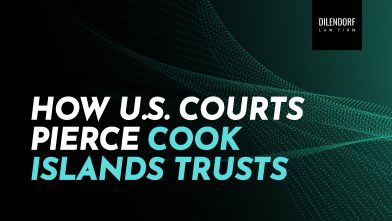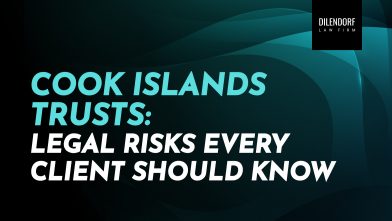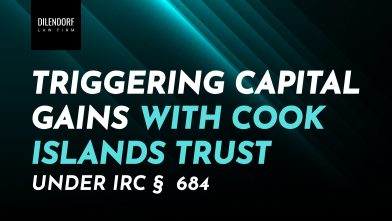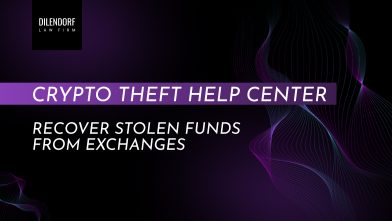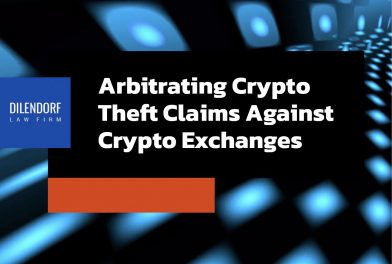Offshoring DAO Foundations: Top Legal Considerations
I. INTRODUCTION
Launching a foreign foundation company is a complex undertaking that requires consideration of legal issues that potentially subject the foundation to government scrutiny by regulatory agencies such as the Department of Justice (DOJ), the Securities and Exchange Commission (SEC), and the Internal Revenue Service (IRS).
Moreover, setting up a foreign foundation entity has become an increasingly utilized mechanism for resolving DAO structure issues: the foundation provides an extremely flexible framework that supports off-chain functions bound to executing a DAO’s governance protocols; and, the favorable tax regimes of foreign jurisdictions also lessen the DAOs’ burden of tax expenses otherwise required to be paid under U.S. tax laws.
Nonetheless, despite the appeal of setting up a foreign foundation, the practices of offshoring governance tokens to foreign jurisdictions with favorable tax regimes — such as the Cayman Islands, BVI, Panama, Singapore, Ireland and Switzerland — and wrapping the Decentralized Autonomous Organization (DAO) in a foundation entity formed in such jurisdiction poses a broad range of legal risks that developers, investors, administrators, and other DAO members must take into consideration.
II. TOP LEGAL CONSIDERATIONS
1. The Foundation Company Structure Is Not Operated In A Truly Decentralized Manner.
To achieve decentralization, networks must develop over time so that no single person or entity has managerial control over the maintenance of the network, the ability to influence investments, or control the network’s token supply.
In theory, every network originates with a central founder or team; and so, when converting from a centralized network, it is common practice to create non-profit foundations tasked with overseeing the operations of the network and divide the founders into separate entities so that their influence is on par with the other participants in the network.
The process of becoming fully decentralized is not an easy endeavor, and cannot be achieved overnight; as such, when striving for decentralization, network founders should be wary of taking shortcuts by setting up foundation entities that do not actually accomplish the objectives of DAOs.
The 2017 Cayman Islands Foundation Companies Law (Foundation Law) introduces a novel corporate vehicle that plays dual roles: the foundation can exist as a separate legal personality and limited liability company, or it can function like a trust.
This secondary role potentializes the foundation to identify beneficiaries to receive benefits over time and provides for certain powers to be held by persons or entities other than the directors of the foundation.
Importantly, in the context of DAOs, a foundation can cease to have members (i.e., shareholders), thus making it appear ownerless; however, to achieve genuine decentralization, the DAO network must be trustless and controlled by the community governance.
Therefore, although the foundation structure attracts DAO Developers, it does not operate in a manner that is truly decentralized.
Among the topics debated regarding the community governance forum are whether the DAO should dissolve or transform into something more like a classic corporation.
When DAO Developers realize the difficulties of establishing a truly decentralized entity, they move to form foreign foundations that resemble a more traditional corporate structure.
These struggles are exemplified by DAOs that transition to the foundation structure only to dissolve back to the DAO within a short period of time.
For instance, in 2018, the MakerDAO created the Maker Foundation in the form of a non-profit responsible for overseeing funding and development.
After only two years, the Maker Foundation transferred its token contract (MKR) to community governance as an effort to return to the DAOs decentralized operations.
Ultimately, internal tensions between supporters of the Maker Foundation and those who saw the legal entity as an anathema to the anarchic ethos of crypto lead to the dissolution of the foundation.
Operated as a Trust:
The Foundation Law is said to “exclude[] the creation of any inadvertent common law trust rights and limits the beneficiary’s rights to those expressly stated by the foundation company,” yet this is not what is actually occurring in practice.
Under the foundation structure, the designated beneficiaries are responsible for ensuring directors meet their obligations to a DAO governance, similar to how trustees carry out the objectives of a trust.
Since a foundation company can be structured without shareholders, one could argue that it is distinct from a typical company; however, this is a weak argument, as the foundation is still managed by designated beneficiaries that serve as supervisors and directors to carry out the objectives of the DAO.
Some networks use the foundation company structure as a solution to issues associated with the DAO, but by operating similar to a trust, they are derailing the essential purpose of a decentralized community.
If a United States company sets up an offshore foundation that is deemed to be operating as an incorporated trust, then the foreign trust is subject to U.S. tax filing requirements.
These requirements include either Form 3520, Annual Return to Report Transactions with Foreign Trusts and Receipt of Foreign Gifts (Decl. ¶ 56) and/or Form 3520-A, Annual Information Return of Foreign Trust With a U.S. Owner (Decl. ¶ 57).
Additionally, U.S. taxpayers with an ownership interest in a foreign corporation may be required to file a Form 5471, Information Return of U.S. Persons With Respect to Certain Foreign Corporations (Decl. ¶ 58). See Memorandum In Support Of United States’ Ex Parte Petition For Leave To Serve “John Doe” Summons (John Doe Memorandum).
Controlled by Central Authority:
The core premise of DAO decentralization is undermined by the structure of a foundation company as the foundation is set up to have a legal personality and is treated like a typical company (i.e., able to enter into contracts, undertake actions with third parties, etc.).[1]
As a general rule, a blockchain qualifies as a decentralized database if it allows for peer-to-peer transfers of digital assets on a network without the need for an intermediary, such as a central governing authority or a bank.[2]
Establishing an offshore foundation shifts ownership into the hands of another legal entity and away from the actual beneficial owner.
Furthermore, when DAO Developers choose to set up an offshore foundation company in foreign jurisdictions like the Cayman Islands, Panama, and BVI, they do so with the knowledge that these jurisdictions require some person or group to act as the owner of the DAO foundation.
The Foundation Law actually requires both a secretary (a person licensed to provide company management services in the Cayman Islands) and a supervisor (a person, other than a member, who has a right to attend and vote at general meetings).
It is inaccurate to suggest that these supervisors lack ownership or economic entitlement in the foundation company; in fact, they act as advisors to directors of the foundation and ultimately have control over the governing documents of the DAO.
This alone strongly indicates that a foundation company is operated by a controlling authority; therefore, it is not truly decentralized and likely subject to government interference.
Allocation of Voting Tokens:
Beyond the supervisory mechanism, token allocation further evidences the presence of a central authority in a foundation company.[3]
For a DAO to be a truly decentralized organization, it must be governed by a community forum without a legal personality assigning responsibilities and ownership rights to any central person or thing.
Moreover, for the community forum to remain decentralized, no singular group may possess the power to make decisions based on their token holdings.
Many governance protocols claim to be fully decentralized yet fail to achieve the level of decentralization necessary to continue operating without government interference.
For instance, some protocols claim to be decentralized by heavily marketing a loan approval process — such as an “auditor” system — whereby community members are randomly selected to vote and approve loans, but we have yet to see such a program actually take effect.
This prompts the question of who is actually approving the lending, and the answering being: those who are allocated the most tokens.
Through token allocation, protocols distribute tokens to large venture capital firms and other inside investors who then maintain a sizeable percentage of voting tokens.
To illustrate this point, it is nearly always the case that over 50% of token supply belongs to venture capital investment firms and insiders.
While a DAO Foundation distributes governance tokens, the power to make protocol changes and allocate funding in the governance treasury actually rests in a group of insiders who have control of a mult-sig wallet that makes decisions.
This insider problem is exacerbated by the often low-voter turnouts of individual token holders, making it easy for big players to influence outcomes. Therefore, the allocation of governance tokens to inside investors establishes a central control (or hierarchical structure) and defeats the purpose of the DAO community forum.
“The federal securities laws apply with equal force to age-old frauds wrapped in today’s latest technology,” said Daniel Michael, Chief of the SEC Enforcement Division’s Complex Financial Instruments Unit. “Here, the labeling of the offering as decentralized and the securities as governance tokens did not hinder us from ensuring that DeFi Money Market was immediately shut down and that investors were paid back.”
2. Regulatory Scrutiny of Government Agencies
Tax Treatment of Offshore Entities:
In general, a United States trade or business that also operates in a foreign jurisdiction is subject to U.S. income tax laws on the portion of the income that is effectively connected to that U.S. trade or business.[4]
Moreover, setting up an offshore foundation in tax-neutral jurisdictions does not excuse the U.S. trade or business from the prowess of the IRS to attribute the portion of business being conducted in the U.S as taxable and require the necessary tax filings, tax reporting, and payments to resolve.[5]
Therefore, regardless of any foreign structuring, DAO Developers with a protocol established in the U.S. must carefully consider whether related activities undertaken in foreign jurisdictions create a taxable presence in the U.S. both for federal and state income tax purposes.
Legal Actions Involving Tax Fraud Mechanisms Closely Mimic the Characteristics of Foreign DAO Foundations:
Adopters of the Foundation Company structure face significant legal risks because the federal government has targeted, and ultimately collapsed, foundations in legal actions involving tax fraud mechanisms which closely mimic the characteristics of foreign established DAO foundations in the crypto space.
The current framework provided by the Foundation Law lacks transparency requirements and gives leeway to complying with U.S. tax laws that require disclosure of foreign financial accounts and paying applicable U.S. taxes.
In determining whether a foundation company will be subject to regulatory scrutiny, government agencies will examine the operational nature of the foreign account to determine whether the foundation is compliant with U.S. legal requirements.
Lack of Transparency and Concealment of Beneficial Ownership:
Foundation Companies Are Not Compliant with U.S. Tax Laws Because They Lack Transparency and Conceal Beneficial Ownership.
The lack of transparency of ownership enables DAO Developers to conceal the true beneficial ownership of those who ultimately have a controlling ownership interest in the assets of the DAO.
Foundation companies are not required to report beneficial ownership, allowing for the potential to evade other legal requirements.
This is commonly seen as a strategy used to commit tax evasion. Tax evasion is frequently associated with offshore entities (or pyramid of entities) such as a corporation, trust, or foundation that set up foreign financial accounts. Decl. ¶¶ 6, 60.
These entities are used to conceal the U.S. taxpayer’s beneficial ownership of offshore or domestic accounts and assets. Id.
Despite understanding that U.S. taxpayers have a legal duty to report to the Internal Revenue Service (IRS) and pay taxes on the basis of all their income, the taxpayers often utilize the services of offshore trusts and corporate service providers that open bank accounts; create corporations, trusts, and foundations; and serve as nominee directors, officers, and/or trustees for the beneficial owner. Decl. ¶¶ 6, 60.
Further, taxpayers with offshore financial accounts often transfer funds from their offshore accounts through the use of prepaid debit cards issued by offshore banks. Decl. ¶¶ 8, 60.
For example, SML offers ATM/debit cards called “Sovereign Gold Cards” and engages in the formation of anonymous foundations in offshore locations such as Panama (See John Doe Memorandum). Dec. ¶¶ 11, 28 – 31. The structure of these offshore foundations offers anonymous corporations with an account “plus nominee director and shareholder service for complete anonymity.” Decl. ¶ 21.
Additionally, in an effort to catch criminal offshore tax evasion, the Department of Justice (DOJ) announced that the Swiss Bank Program has provided information to reveal the various schemes used by U.S. taxpayers to conceal their foreign accounts.
In the case of Privatbank IHAG Zürich AG (IHAG), the bank assisted clients in establishing foundations used to hold their assets at IHAG.
The beneficial owners of the foundation accounts were properly identified as beneficial owners of the foundations on certain forms pursuant to Swiss laws; however, on IRS Forms W-8BEN, the foundations were identified as the beneficial owner indicating intentional concealment of true beneficial ownership.
For example, in 2006, an account held in the name of a Panama company was opened. In connection with the opening of the account, bank documents identified a U.S. person as the beneficial owner of the assets.
However, a Form W-8BEN signed by two Swiss citizens and a citizen of Liechtenstein falsely declared that the Panama company was the beneficial owner. The U.S. person instructed IHAG not to communicate with him by phone and insisted on using code names when communicating with IHAG.
Ultimately, the DOJ deemed the acts of IHAG to constitute criminal activity subject to federal penalties.
Similarly, in United States v. Hough, 803 F.3d 1181, 1183 (11th Cir. 2015), the defendant and coconspirator owned two medical schools generating millions of dollars in the Caribbean. Id.
Instead of reporting the income, the couple established entities (including a foundation) to hide it in multiple offshore accounts. Id. The court supported the defendant’s convictions for attempting to defraud the IRS because she failed to disclose her financial interest in foreign bank accounts. Id.
Akin to cases of tax fraud, offshore DAO foundations utilize the foundation structure to mask true beneficial owners.
Instead of transferring funds from offshore accounts through the use of prepaid debit cards, DAO foundations distribute tokens to participants in the DAO community who are able to remain anonymous while retaining the assets of the DAO.
To illustrate this point, SEC filings show that some DAO Protocols have established foundations incorporated in Panama and the Cayman Islands and filed a Form D “Notice of Exempt Offering of Securities” with the SEC, claiming an exemption under Rule 506(b) which allows for private placements.
Setting up a foundation in a foreign jurisdiction whose operations are based primarily outside that jurisdiction allows the foundation to be incorporated as an exempted company, meaning that a foreign foundation’s shareholders will not be subject to any income, withholding or capital gains taxes in places like the Cayman Islands with respect to their shares and dividends received on those shares.
Notably, despite establishing an offshore foundation in a tax-neutral jurisdiction, the IRS has the power to recharacterize the income and impose tax limitations.
These foundations then distribute the governance tokens for the protocol where holders of the tokens manage the community DAO.
Owners of the tokens get to vote on what happens with the reserves just as banks lend money and take a percentage of the cut.
Notwithstanding the attempt to divert attention from ownership, the establishing parties maintain effective control by acting as advisors and maintaining a sizable percentage of voting tokens.
It is clear that the lack of transparency used to conceal beneficial ownership aids in criminal activity and places these foundations at risk of being collapsed by government agencies.
Approaching Precedent – Anonymity Aids in Fraudulent Transactions:
Dividing a network into separate foreign foundation entities for the sole purpose of creating an illusion of decentralization is increasingly coming under the purview of the federal government.
On April 14, 2022, a lawsuit filed in the U.S. District Court for Connecticut alleges that the co-founders of the OlympusDAO breached the token purchase agreement (TPA), thereby swindling an early investor out of nearly 4 million in OHM tokens (valued at about $20 million).
Further, the TPA leads investors to believe that money raised in the private funding round would go to the Switzerland-based Hephaestus Foundation; however, no such foundation appears to exist.
The facts and allegations set forth in the Complaint illustrate the inherent legal risks associated with the foreign foundation entity structure for both DAO Developers and investors.
In the suit, the Plaintiff claims that after he began selling a portion of his tokens, Olympus sent him a message criticizing him against selling his tokens acknowledging that the investor holds nearly 75% of the investor sales.
Consequently, the Olympus team interfered with the operation of the smart contracts by barring the Plaintiff from converting his tokens and receiving a return on his investments. Such interference is the exact type of centralized control unauthorized in a decentralized framework.
Meaning, if the Olympus team had the authority to control — and indeed did control smart contract functionality — this would serve to directly undermine decentralization of the Olympus project.
Additionally, the mere advertisement of a democratic community voting structure does not constitute a decentralized protocol when the distribution of control rests primarily in the pockets of insiders.
Since these governance provisions are created by the Developers themselves, many protocols are structured to allow small groups of individuals to retain control through back-end transactions.
Despite attempting to mask its central authority, the OlympusDAO — like many networks that claim to be completely decentralized — is controlled in practice by a group of insiders who are making decisions and controlling operations related to the project.
Since its inception, the founders and contributors of the OlympusDAO have reaped the benefits of pseudonymity fostered in a decentralized community, but the anonymous nature of DAOs spurs operational problems as the degree of anonymity often impedes accountability and facilitates abuses of power.
The OlympusDAO case epitomizes these conflicts, as its founders seemingly exerted managerial control over the smart contracts.[6]
Olympus is controlled by its pseudonymous founder, Zeus, as well as other entities, to protect its members from liability. Not only are the identities of Olympus’s founders undisclosed, but there is also no officially registered company behind the fundraiser, proving difficult for an investor to pursue legal action against the project.
The attempt to use the foundation structure and shift power and control to a foreign foundation is an insufficient means of achieving decentralization especially when a central body of members is directing the decision making of the protocol.
Accordingly, these so-called “DAOs” are engaging in the sale of unregistered securities subject to federal prosecution.
Had Olympus legally sold the OHM token, they would have been required to comply with federal laws and provide investors with certain disclosures, including a registration statement identifying material information regarding the identity of the OlympusDAO management.
Based on the facts set forth in the Complaint, it does not appear as though Olympus is running a legally legitimate DAO, nor will its use of a foreign foundation excuse its misrepresentations from legal consequences.
III. CONCLUSION
While legislative action regarding DAO entity forms awaits the industry, there is great risk for DAOs utilizing the mechanism of foreign foundations because the current structure does not support a truly decentralized network, conceals true beneficial ownership, and operates similarly to foundations that have been previously collapsed by the DOJ.
While claiming to place ownership into the hands of another legal entity, the beneficial owner in fact retains control through token allocation designated to major venture capital investors.
Furthermore, the legal structures available in many foreign jurisdictions require some person or group to act as the owner of the DAO, allowing for direct control of the company through the foundation.
Although other platforms are currently utilizing the offshore foundation structure without regulatory interference, this is a questionable position that will likely be collapsed by the federal government, mimicking the DOJ’s enforcement in cases of tax fraud.
[1] The Foundation Company as a Decentralised Autonomous Organisation (DAO) in the Cayman Islands, Ogier, (2020) https://www.ogier.com/publications/the-foundation-company-as-a-decentralised-autonomous-organisation-dao-in-the-cayman-islands . The foundation company is touted as a “perfect fit as it acts like a legal trust and has the power to designate beneficiaries.” Id.
[2] See Melanie Swan, Blockchain: Blueprint for a New Economy, 19-20 (2015) (“The blockchain is the decentralized transaction ledger that is part of a larger computing infrastructure that must also include many other functions such as storage, communication, file serving, and archiving.”); Jorge Pesok, SEC’s Blockchain Stance Will Likely Impact Exchanges, Law360 (2017), https://www.law360.com/articles/952055/sec-s-blockchain-stance-will-likely-impact-exchanges.
[3] The purpose of governance tokens is to create a decentralized decision-making process for DAO members to engage with the protocols and control the smart contracts underlying the DAO. Members with majority governance tokens have greater control and voting power on operational decisions.
[4] See Internal Revenue Service, Effectively Connected Income (ECI), (2021), https://www.irs.gov/individuals/international-taxpayers/effectively-connected-income-eci.
[5] It should be noted that the IRC’s definition of a “covered” security is oftentimes much wider than the SEC’s interpretation and that an asset could be considered a security for purposes of taxation without undercutting its assertions related to treatment as a security by the SEC. Accordingly, a path to exclude a DAO’s activities does present itself in the exception to effectively connected foreign income, but it must be carefully examined considering the significant risk associated with offshoring an entity for other reasons besides this issue.
[6] MakerDAO is an Ethereum-based decentralized DAO that issues the stablecoin DAI backed by a mixture of overcollateralized loans and Makerdao’s repayment scheme. MakerDAO issues a token pegged to the price of the U.S. dollar without an intermediary.
Additional Resources:
- SEC Charges Decentralized Finance Lender and Top Executives for Raising $30Million Through Fraudulent Offerings
- Decentralization, DeFi and MakerDAO – CFTC
- Climate Change and Decentralized Finance: New Challenges for the CFTC
- How Blockchain can Impact Financial Services – Overview, Challenges and Recommendations
- Distributed Ledger Technology in Payments, Clearing and Settlement
- The Rise of Bitcoin: Understanding the Ins and Out of this Cryptocurrency
- Examining Regulatory Framework for Digital Currencies and Blockchain
- Opening Statement of Commissioner Brian Quintenz before the CFTC Technology Advisory Committee
- Understanding Blockchains and Their Benefits for Small Business
- Blockchain Disruption and Decentralized Finance: the Rise of Decentralized Business Models

